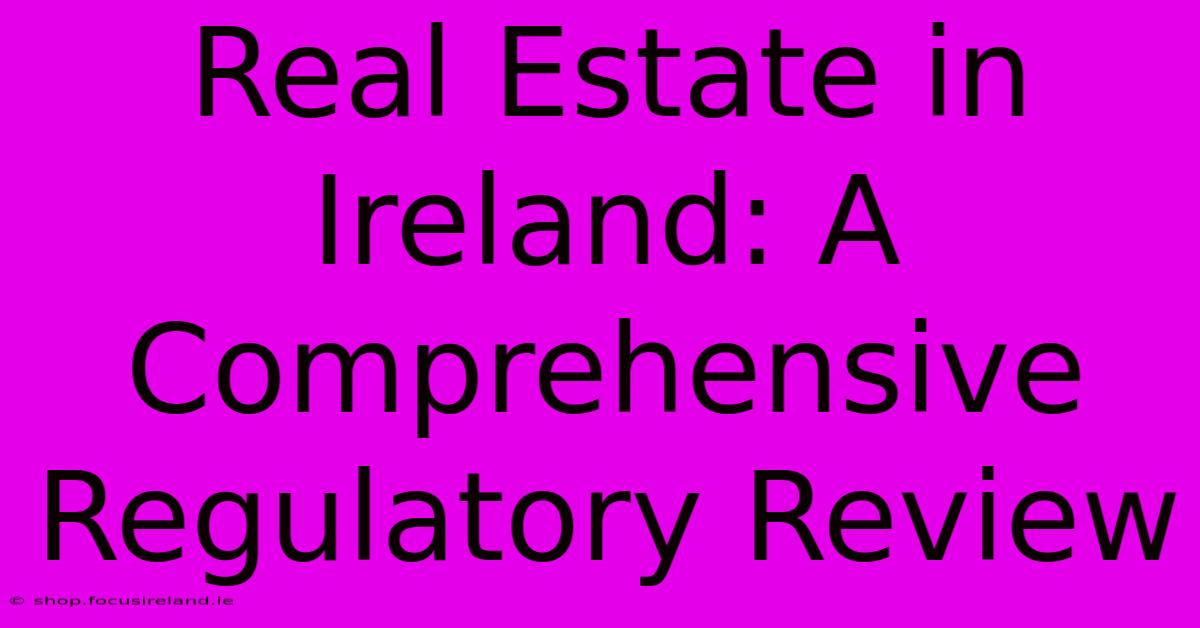Real Estate In Ireland: A Comprehensive Regulatory Review

Table of Contents
Real Estate in Ireland: A Comprehensive Regulatory Review
The Irish real estate market, while dynamic and attractive, operates within a complex regulatory framework. Understanding this framework is crucial for both investors and homeowners. This comprehensive review delves into the key regulations impacting property transactions, development, and ownership in Ireland.
Key Regulatory Bodies in Irish Real Estate
Several organizations play pivotal roles in shaping and overseeing the Irish property landscape. These include:
- The Department of Housing, Local Government and Heritage: This department sets the overall policy direction for housing and planning in Ireland. It's responsible for legislation impacting the sector.
- The Planning Authority (Local Councils): Local councils are responsible for processing planning applications and enforcing planning regulations within their respective areas. Navigating local planning laws is crucial for any development project.
- The Property Registration Authority (PRA): The PRA maintains the national register of property ownership, ensuring transparency and security in land transactions. Registration of ownership is a critical aspect of any property deal.
- The Revenue Commissioners: Tax implications are significant in property transactions. The Revenue Commissioners oversee stamp duty, property tax, and capital gains tax related to property ownership.
- The Central Bank of Ireland: The Central Bank plays a role in regulating mortgage lending and ensuring financial stability within the real estate sector.
Navigating the Planning Process in Ireland
Securing planning permission is often the most significant hurdle in any Irish property development. The process involves:
- Pre-Application Consultation: Engaging with the local planning authority early is advisable to discuss the viability of a project.
- Formal Planning Application: Submitting a comprehensive application with detailed plans, environmental impact assessments (where necessary), and other relevant documentation.
- Public Consultation: The planning authority will consult with the public and neighboring residents.
- Planning Decision: The authority will issue a decision, granting permission, refusing permission, or requesting further information.
- Appeals Process: Decisions can be appealed to An Bord Pleanála, the national planning appeals body.
Key Considerations in the Planning Process:
- Zoning Regulations: Understanding the zoning regulations for the specific location is paramount.
- Environmental Impact: Environmental protection is a key consideration, particularly for large-scale developments.
- Accessibility Requirements: Planning regulations emphasize accessibility for people with disabilities.
Property Transactions and Legal Considerations
Buying or selling property in Ireland involves several legal steps:
- Solicitor's Role: Engaging a solicitor is essential. They handle all legal aspects, including contract negotiation, searches, and registration of ownership.
- Due Diligence: Thorough due diligence is crucial to verify the property's title, planning compliance, and any encumbrances.
- Stamp Duty: Stamp duty is a significant tax payable on property transactions. The rate varies based on the property value and the buyer's circumstances.
- Property Tax: Annual property tax is levied on property owners.
Mortgage Regulations and Financing
Securing a mortgage is typically necessary for property purchases. The Central Bank's regulations influence the mortgage market, including:
- Loan-to-Value (LTV) Ratios: Restrictions on LTV ratios aim to manage risk in the mortgage market.
- Stress Testing: Lenders are required to stress test borrowers' ability to repay loans under adverse economic conditions.
- Affordability Assessments: Lenders must conduct comprehensive affordability assessments to ensure borrowers can comfortably repay their mortgages.
Tax Implications in Irish Real Estate
Understanding the tax implications is vital. Key areas include:
- Stamp Duty: Payable on property purchases.
- Capital Gains Tax (CGT): Applies to profits made on the sale of property.
- Property Tax: An annual tax levied on property owners.
- VAT (Value Added Tax): Applicable to the construction and sale of new properties.
Future Trends and Outlook for Irish Real Estate
The Irish real estate market is constantly evolving. Factors such as population growth, government policies, and economic conditions will shape its future. Staying informed about these trends is crucial for all stakeholders.
This review provides a general overview. Specific circumstances may require consultation with legal and financial professionals. Always seek professional advice tailored to your individual situation. The information contained herein is for informational purposes only and should not be considered legal or financial advice.

Thank you for visiting our website wich cover about Real Estate In Ireland: A Comprehensive Regulatory Review. We hope the information provided has been useful to you. Feel free to contact us if you have any questions or need further assistance. See you next time and dont miss to bookmark.
Featured Posts
-
Irelands Coastal Honeymoons All Inclusive Packages
Mar 29, 2025
-
Ireland Beyond The Guinness Authentic Experiences
Mar 29, 2025
-
Escape To The Country Affordable Irish Homes
Mar 29, 2025
-
Experience Ireland Authentically Off The Beaten Track
Mar 29, 2025
-
Modern Limerick Houses Contemporary Design And Style
Mar 29, 2025
